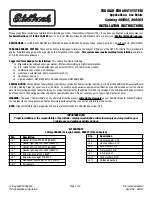
The weight that the tongue of a fully
loaded trailer puts on the hitch
should be 5 to 10 percent of the total
trailer weight for boat trailers, and 8
to 15 percent of total trailer weight
for all other trailers. See page for
limits for your towing situation.
Too much tongue load reduces front-
tire traction and steering control.
Too little tongue load can make the
trailer unstable and cause it to sway.
Park the vehicle on level ground.
Measure and record the distance
from the ground to the bottom of
the trailer hitch.
Connect the fully loaded trailer to
the hitch.
Measure again from the ground to
the same spot on the bottom of the
hitch.
Subtract the second measurement
from the first measurement. Refer
to Fig. 1.
If the difference is:
1 ½’’ = 150 lbs (68 kg)
2 ¼’’ = 250 lbs (114 kg)
3’’ = 350 lbs (159 kg)
3 ¾’’ = 450 lbs (204 kg)
4’’ = over 450 lbs (204 kg)
If the difference is more than 4’’
you have too much tongue load
at the rear. Move or remove
cargo from the trailer and the
vehicle, and measure again.
If the estimated trailer weight and
tongue load do not exceed the limits,
drive your trailer to a public scale
fully loaded with all occupants and
cargo you plan to take on the road.
1.
2.
3.
4.
5.
187
Tongue Load
To Estimate the Tongue Load
Fig.1
Towing Weight Limits
Driving
186
03/08/19 23:00:12 31S3V630 0191
















































